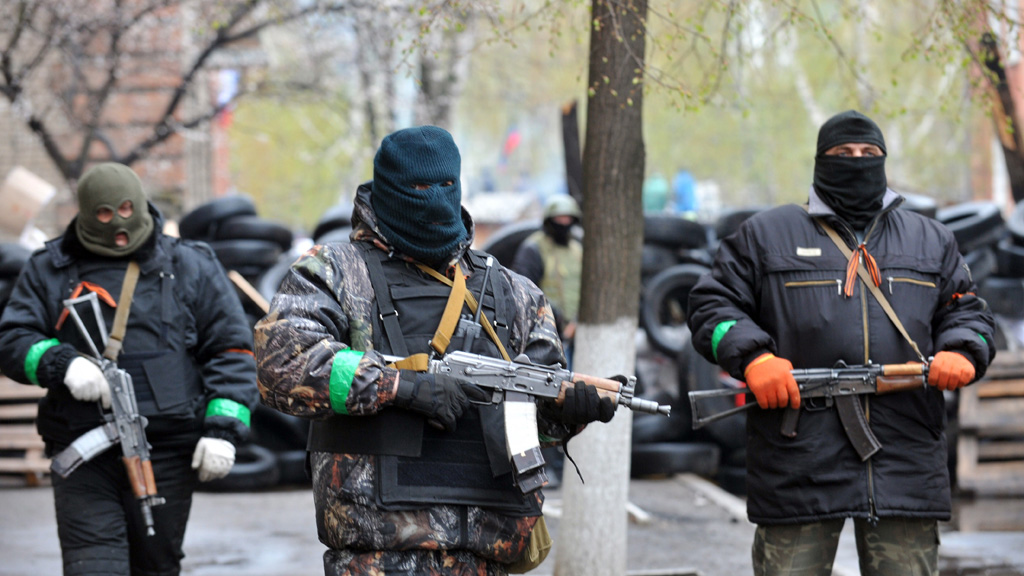Bloodshed in east Ukraine ‘anti-terror operation’
Reports of death and injury on both sides as Ukraine’s security forces attempt to take back buildings in the east of the country which have been occupied by pro-Russian gunmen.

In the eastern city of Slaviansk, one Ukrainian security officer was apparently killed and five more injured as the security services attempted to take back buildings, including the police headquarters, which were seized by pro-Russian protesters on Saturday.
Russian news agency RIA also reported that one of the pro-Russian protesters had died in the clashes.
Describing the clashes as an “anti-terror operation” on his Facebook page, Interior Minister Arsen Avakov said there had been an “unidentifiable number of casualties”.
“There were dead and wounded on both sides,” he said, also warning civilians not to come to the centre of town.
In Kramatorsk, where buildings are also occupied, heavy gunfire could be heard as security forces stormed the building (watch the video below).
Read more from Paul Mason on a moment of 'acute danger' in Ukraine
The violent clashes across several cities in the region risk tipping the situation in eastern Ukraine into a new and dangerous phase, because Russia has warned it will act to protect eastern Ukraine’s Russian speakers if they come under attack.
For its part, Ukraine considers the occupation of buildings by pro-Russian protesters, armed with guns, an “act of aggression” by Russia.
The United States ambassador to the United Nations, Samantha Power, warned that the US was prepared to step up sanctions against Russia if the situation continued, saying the latest events bore “the telltale signs of Moscow’s involvement”.
Nato described the appearance in eastern Ukraine of men with specialized Russian weapons and identical uniforms without insignia – as previously worn by Moscow’s troops when they seized Crimea – as a “grave development.”
The situation in Ukraine has destabilised since its pro-Russian president was ousted earlier this year by protests after he moved away. diplomatically, from the European Union and towards Russia. The country is split between areas like the capital Kiev, where many lean towards Europe, and other areas with many ethnic Russians and Russian speakers whose loyalties lie elsewhere.
Assumptions that Russia is complicit are inevitable as long as Moscow does not publicly distance itself from these latest lawless actions. Foreign Office spokesman
Russian Foreign Minister Sergei Lavrov said Kiev was “demonstrating its inability to take responsibility for the fate of the country” and warned that any use of force against Russian speakers “would undermine the potential for cooperation”, including talks due to be held on Thursday between Russia, Ukraine, the United States and the European Union.
Reacting to developments in eastern Ukraine in the past 24 hours, a Foreign Office spokesman told Channel 4 News: “The latest occupations by armed groups of government buildings in towns in eastern Ukraine are a further dangerous escalation of an already dangerous situation.
“Assumptions that Russia is complicit are inevitable as long as Moscow does not publicly distance itself from these latest lawless actions. Russia must desist from steps which destabilise Ukraine and undermine the possibility of contact group talks. European foreign ministers will meet on Monday to discuss how to respond to the latest events.”




